|
|
|
Sort Order |
|
|
|
Items / Page
|
|
|
|
|
|
|
| Srl | Item |
| 1 |
ID:
090888
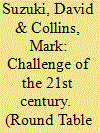

|
|
|
|
|
| Publication |
2009.
|
| Summary/Abstract |
This article outlines the gravity of the environmental crisis-pollution, climate change, overpopulation and the unpredictable environmental impacts from our use of science and technology and exploitation of natural resources. We must put the 'eco' back into economics and realise what the conditions and principles are for truly sustainable living. We have to set a new bottom line, a bottom line dictated by the reality that we are biological creatures, completely dependent for our survival and well-being on clean air, clean water, clean soil, clean energy and biodiversity. We are social animals who need strong families and supportive communities, full employment, justice, equity and security and freedom from racism, terror, war and genocide. And we remain spiritual beings who need sacred places in the natural world that gave us birth.
|
|
|
|
|
|
|
|
|
|
|
|
|
|
|
|
| 2 |
ID:
090881
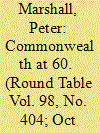

|
|
|
|
|
| Publication |
2009.
|
| Summary/Abstract |
The London Declaration of 26 April 1949, made by Commonwealth Prime Ministers, was an act of statesmanship of rare insight and imagination, as was its approval by King George VI. It paved the way for the emergence of a voluntary forward- and outward-looking association of sovereign, independent governments and peoples, alive to their common values and traditions, and conscious of the contribution they can together bring to making the world a better place. The Commonwealth is an international asset as well as a boon to its members.
|
|
|
|
|
|
|
|
|
|
|
|
|
|
|
|
| 3 |
ID:
090882
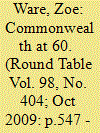

|
|
|
|
|
| Publication |
2009.
|
| Summary/Abstract |
This article offers some thoughts about the Commonwealth in its 60th anniversary year by a young observer from the 'new generation'. It argues that the Commonwealth must pay particular attention to creating a positive first impression on young people, so that it can be defined through the relevance of its current actions rather than through history books. It suggests that, in a crowded international marketplace, the Commonwealth must identify a Unique Selling Point that will be of long-term value to its members, and prove that it can do things and reach places that other international associations cannot. Its shared commitments and values give the Commonwealth the potential to be a true voice of moral authority on the world stage. Yet until the Commonwealth can truly be defined by its Harare principles, rather than with reference to the historical bonds that originally threw it together, it will struggle to transcend the inaccurate image which young people hold of it. The article concludes by looking forward to the global challenges, questions of membership and expansion, and the sensitive issue of Headship that the Commonwealth will be faced with before its 100th birthday.
|
|
|
|
|
|
|
|
|
|
|
|
|
|
|
|
| 4 |
ID:
090889


|
|
|
|
|
| Publication |
2009.
|
| Summary/Abstract |
The Commonwealth is short of imaginative leaders after the outstanding generations of Nehru, Trudeau, Nyerere, Lee Kuan Yew, Mandela, and Manley. Yet more than other international bodies it depends on the energy, ideas and personal contact of the people at the top. Democracy is producing a greater turnover of heads of government, but in this hurried world Commonwealth summits are now down to three days and the leaders are not getting enough time to get to know each other face to face in the way that they did in the 1960s, 1970s and 1980s. Between the 2007 summit in Kampala and the 2009 meeting in Port of Spain (27-29 November), 17 new heads of government have taken over. Yet the association is thriving and growing, especially as the work of its civil society organisations grows apace.
|
|
|
|
|
|
|
|
|
|
|
|
|
|
|
|
| 5 |
ID:
090879


|
|
|
|
|
| Publication |
2009.
|
| Summary/Abstract |
Nigerian security forces put down an Islamist uprising by militants of Boko Haram that left 700 people dead. The leader of the Pakistan Taliban, Baitullah Mehsud, was killed in a US missile strike and Islamist militants were pushed out of the Swat valley after weeks of fighting. Zambia's former president Frederick Chiluba was acquitted of embezzlement. The Commonwealth Human Rights Initiative opposed Rwanda's application for Commonwealth membership. Tonga suffered one of its worst disasters in recent history when a ferry sank, killing 74 people.
|
|
|
|
|
|
|
|
|
|
|
|
|
|
|
|
| 6 |
ID:
090887


|
|
|
|
|
| Publication |
2009.
|
| Summary/Abstract |
The Commonwealth and the University of Cambridge share values and challenges in the 21st century. The world has changed rapidly and old polarities are no longer relevant. A 'globalising world' is better described as a 'compacting world'. The environment, the role of technology and non-state actors pose major challenges and opportunities. The Commonwealth is by nature ideally suited to be a 'tipping point organisation' in this world, especially in regard to youth, women and the girl child, issues of respect and understanding, order and disorder.
|
|
|
|
|
|
|
|
|
|
|
|
|
|
|
|
| 7 |
ID:
090885
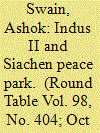

|
|
|
|
|
| Publication |
2009.
|
| Summary/Abstract |
The peace process between India and Pakistan, which started in 2000, moved very slowly before coming to a standstill following the terror attack on Mumbai in November 2008. This article argues that both these two South Asian neighbours need to focus on new areas of bilateral cooperation, which might help them to build mutual trust and provide much-needed impetus to bring peace in the region. The Indus River Agreement of 1960 between India and Pakistan, with its only focus on water sharing, has not been able to generate positive spin-off effects. If both the countries agree to renegotiate the Indus Agreement into an integrated river basin management mechanism, the benefit-sharing might have other peace-enhancing effects and can contribute to bilateral cooperation in other areas. Besides renegotiating the Indus Treaty, both India and Pakistan may also opt for another resource-based conflict management strategy in their tense border areas. For a quarter of a century, both these countries have been involved in an armed conflict to gain control of the Siachen glacier. If they decide to covert this disputed area as a Peace Park, it may provide an excellent exit strategy for both the armed forces-and the local people will support this move as it will give a boost to eco-tourism in the area. India and Pakistan, by establishing a Peace Park in Siachen and forming a basin-based river management institution on the Indus River, can reduce their trust deficit, which will help them to address their other long-standing bilateral contentious issues.
|
|
|
|
|
|
|
|
|
|
|
|
|
|
|
|
| 8 |
ID:
090884
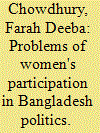

|
|
|
|
|
| Publication |
2009.
|
| Summary/Abstract |
Women's participation in politics is extremely limited in Bangladesh despite the country having had two prominent women leaders. Sheikh Hasina and Khaleda Zia gained the highest leadership positions in the government and the opposition through their family connections due to the low level of political institutionalization and the absence of suitable male heirs. By their family connections, they have overcome the problems that women otherwise face in politics. Why are Bangladeshi women not more prominent in politics? What are the problems women face when they participate in politics? Here the problems faced by women in politics in Bangladesh are analysed in both the public and the private spheres of patriarchy.
|
|
|
|
|
|
|
|
|
|
|
|
|
|
|
|
|
|
|
|
|